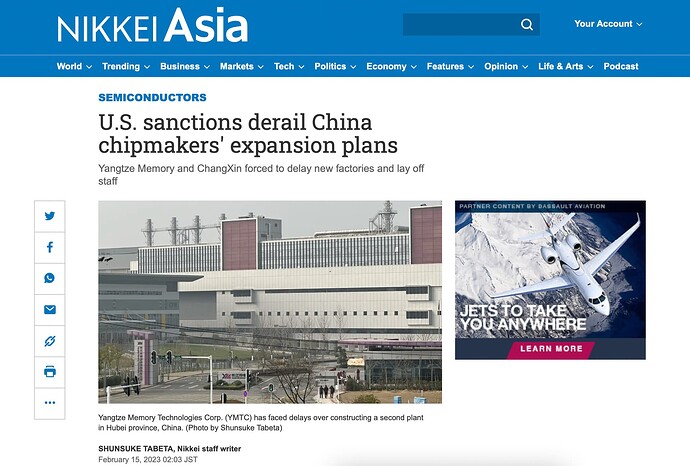-
美国去年秋天实施的全面出口禁令阻碍了中国主要芯片制造商扩大业务的计划,使政府使中国成为半导体强国的雄心受挫。
-
中国的三家政府支持的存储器公司,包括长江存储技术公司(YMTC)和长鑫存储技术公司(CXMT),由于美国的制裁,他们的扩张计划被推迟。
-
YMTC的工程师和技术人员在交付生产设备的现场不知道其第二工厂(原定于2022年底启动)何时能真正上线。自从华盛顿宣布对用于制造先进半导体的技术和设备的出口进行广泛、严格的限制后,该公司的发展就陷入了停滞。
-
CXMT新研发中心的建设似乎也没有取得任何进展。聘请研究生的工作已经暂时停止。该公司正在裁减5%至7%的员工,这取决于不同的部门。
-
统一集团破产后,YMTC接受了大基金和地方政府的管理。它专注于磨练自己在全球NAND市场上的竞争能力,达到了据说苹果公司已经准备在iPhone中使用YMTC芯片的程度。
-
美国的制裁已经迫使YMTC裁员。它的未来看起来不确定,公司的气氛也很严峻。
-
YMTC和CXMT都没有对问题或评论请求作出回应。
-
习近平主席领导的政府在2015年宣布了 "中国制造2025 "倡议,将半导体定位为一个关键产业。大基金是作为该倡议的一部分成立的,并大力支持芯片产业的发展。第一阶段的投资大约达到1400亿人民币。
-
根据《国际商业战略》,中国的半导体自给率从2015年的10%增长到2021年的24%。这家美国研究公司在去年6月发布了一份报告,预测该比例将在2030年超过50%。但当美国后来加强贸易制裁时,IBS首席执行官Handel Jones警告说,到那时自给自足的比例可能会停滞在30%。
-
半导体市场最近一直乏善可陈,中国公司放宽了订单。考虑到这些动态,延迟扩大生产可能不会对中国政府建立一个自给自足的供应链的雄心构成严重打击。
-
美国对中国半导体行业的施压活动正在明显地产生影响,使中国在实现其芯片梦想的道路上走得更陡峭。
-
The sweeping export bans imposed by the US last fall have held up plans by major Chinese chipmakers to expand operations, dealing a setback to the government’s ambitions to make the country a semiconductor powerhouse.
-
China’s three government-backed memory companies, including Yangtze Memory Technologies (YMTC) and ChangXin Memory Technologies (CXMT), have seen their plans for expansion delayed due to the US sanctions.
-
YMTC engineers and technicians at the site to deliver manufacturing equipment had no idea when its second plant, originally slated to start up in late 2022, would actually come online. Its ascent has stalled since Washington announced broad, stringent curbs on exports of technology and gear for making advanced semiconductors.
-
The construction of CXMT’s new research and development center appears to have made hardly any progress as well. The hiring of graduate students has been suspended temporarily. The company is cutting 5% to 7% of staff, depending on the department.
-
After Unigroup went bankrupt, YMTC came under the management of the Big Fund and local authorities. It focused on honing its ability to compete in the global NAND market, reaching the point that Apple had reportedly been set to use YMTC chips in iPhones.
-
The US sanctions have forced YMTC to cut jobs. Its future looks uncertain, and the atmosphere at the company is grim.
-
Neither YMTC nor CXMT responded to questions or requests for comment.
-
The government under President Xi Jinping announced the “Made in China 2025” initiative in 2015, which positioned semiconductors as a critical industry. The Big Fund was established as part of the initiative and has strongly supported the development of the chip industry. First-phase investments reached roughly 140 billion yuan.
-
China’s rate of self-sufficiency in semiconductors grew to 24% in 2021 from 10% in 2015, according to International Business Strategies. The U.S. research company put out a report in June last year that predicted the ratio will exceed 50% in 2030. But when the U.S. later toughened trade sanctions, IBS CEO Handel Jones warned the self-sufficiency share might stall at 30% by that date.
-
The semiconductor market has been lackluster as of late, with Chinese companies easing up on orders. Considering those dynamics, the delayed expansion in production will not likely amount to a critical blow to the Chinese government’s ambition of building a self-sustaining supply chain.
-
The U.S. pressure campaign against the Chinese semiconductor industry is visibly taking its toll, putting the country on a steeper path on realizing its chip dreams.
链接:U.S. sanctions derail China chipmakers' expansion plans - Nikkei Asia
